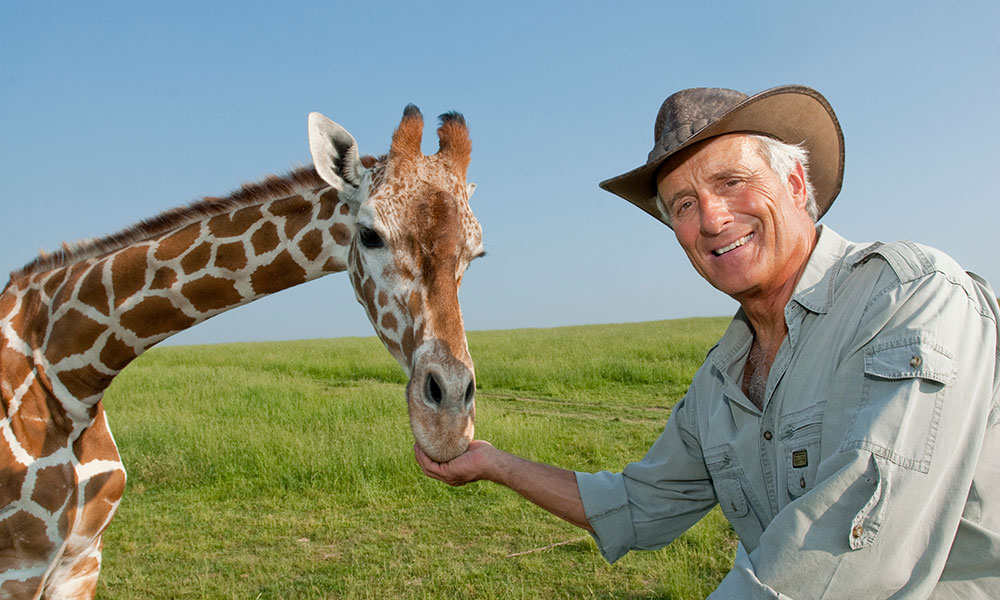Having grown up on 30 isolated acres of land in the Alabama countryside, I spent my childhood exploring the woods and catching little critters. I developed an early love and fascination for animals (not just the three cats that currently torture my furniture). So to say that I’m excited about Jack Hanna’s Into the Wild Live!—starring one of America’s best-known animal lovers—is coming to Proctors next Friday, January 11, would be an understatement.
Haven’t heard of Jack Hanna? He’s the host of two popular TV series, Jack Hanna’s Wild Countdown and Jack Hanna’s Into the Wild!, the latter of which has garnered an impressive five Emmy Awards and seven nominations. Hanna’s also made a name for himself making the rounds on the late-night talk show circuit, with appearances in his signature safari hat on The Late Show with David Letterman and The Late Late Show with James Corden, among others. Before he was one of America’s best known and respected animal experts, Hanna worked as the Director of the Columbus Zoo and Aquarium from 1978 to 1992 (and still serves there as Director Emeritus).
Through the jungles of Central America to the Australian Outback and African Serengeti (and pretty much everywhere else in between), Hanna has educated both live and TV audiences about the diversity of wildlife and the importance of conservation. For his Proctors gig, Hanna will be taking fans on a journey, as he plays recorded footage and relives some of his wildest encounters and adventures with animals (including brushing a hippo’s teeth at the Columbus Zoo). Accompanying Hanna onstage will be an incredible array of rare animals (one of his trademarks). I recently interviewed Hanna about having one of the coolest jobs on the planet.
How did you get your start working with animals?
I’ve loved animals since I was a kid growing up in Tennessee. My first job involved cleaning out kennels at the local veterinarian’s office when I was a teenager. I ultimately decided to follow my dreams of working at a zoo and landed the role of Director of the Columbus Zoo. My job has evolved a lot over the years, but one thing has remained constant: my love of animals.

You’ve been working at the Columbus Zoo and Aquarium for four decades now. How has the zoo and people’s opinion about zoos changed during that time?
The Columbus Zoo has changed radically over the last 40 years, and so has the zoo industry as a whole. There have been huge advancements in veterinary care, animal enrichment and nutrition. We also helped pioneer the movement to naturalistic, enriching habitats for the animals in our care. We have learned so much more about animals and our planet through research done at zoos, and people are able to learn about animals they don’t normally see in a more interactive way. There will always be supporters and skeptics on any issue. However, I know zoos have done, and continue to do, a good job of evolving and growing.
What’s it like being one of America’s most famous zookeepers?
I don’t like the words “celebrity” or “famous,” because from the start, I just wanted to work with animals and teach others along the way. I’ve been very fortunate to get to do that on a national stage, but at the end of the day, I’m still the same kid who grew up loving animals in Tennessee.
Have you been to the Capital Region before? What kind of animals should we expect to see at your show in Schenectady?
I’ve been to Proctor’s before, but always seem to visit in the winter. Unfortunately, I don’t like to promise any particular animals in case they end up not traveling. However, the audience may get a chance to see a penguin, a young kangaroo or maybe even a cheetah!
Globally, animal populations are facing many new and existing threats to their survival. What can the average person do to help offset them?
I choose to look at these issues optimistically. We have to believe we can make a difference and be inspired to make an impact toward the coexistence of all living things. I always recommend starting small: Turn off the lights when you leave a room, recycle, turn off the water when you brush your teeth. Then move onto bigger goals: perhaps composting, reducing single-use plastic in your home or picking up trash at your local beach or park. Every small thing you do contributes to the bigger goal of saving the planet.


